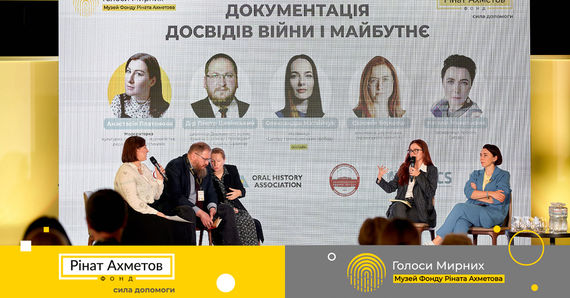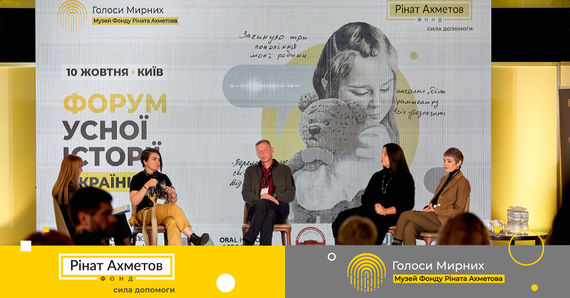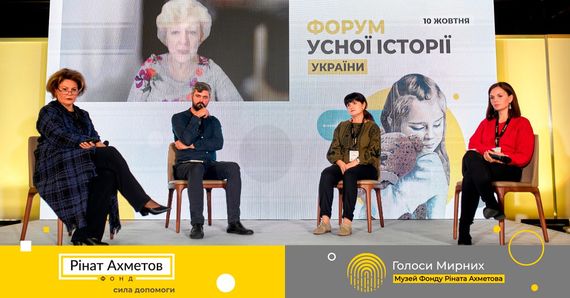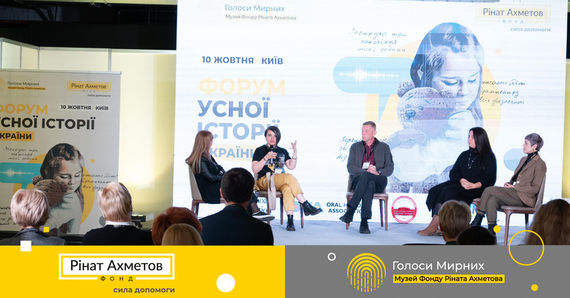Forum of Oral History of Ukraine: Documenting Wartime Experiences, and the Future

One of the discussions at the Forum of Oral History of Ukraine, which took place in Kyiv, was dedicated to the documentation of wartime experiences in the context of the future. The participants of the Forum talked about the impact of the field of documented wartime experiences in Ukraine on various spheres of public life, from the achievement of post-war justice to the advocacy of Ukraine in the international arena.
The event was spearheaded by the Rinat Akhmetov Foundation’s Museum of Civilian Voices in partnership with the USC Shoah Foundation and the Oral History Association, Taras Shevchenko National University of Kyiv, and Maria Curie-Skłodowska University (Lublin).
Moderator Anastasiia Platonova, who is a cultural critic, journalist, editor, analyst, ex-editor of culture section at Forbes Ukraine, opened the discussion:
“We are in a situation of ongoing war. Difficult and painful are not only practical experiences of survival in the war, but also the practices of documenting it. I believe that in this context, the possibility to talk about the future is very therapeutic and important.”
Dr. Piotr Cywiński, a special guest of the Forum, historian, public figure, Director of the Auschwitz-Birkenau State Museum, and president of the Auschwitz-Birkenau Foundation (Poland), talked about how documented wartime experiences help to tell people the truth about these events.
“You have tens of thousands of people who can speak freely. Based on their testimony, prosecutors will easily be able to find people who will act as witnesses. Then the so-called historical period will come, and for historians this will be phenomenal and extremely valuable information. Then the educational period will follow. Children who will be born in 20 years will not remember these events, but for them, it will be an extremely important material thanks to which they will be able to understand their national identity.”
Solomiya Borshosh, executive director of the Ukrainian Institute, spoke about how to communicate with representatives of other countries about Ukraine’s pain, in particular with those who also experienced the tragedy of the war.
“There is a conventional genocide and an assimilating one. The conventional genocide is taking place in Darfur today. How much do we think about it? Assimilating and difficult-to-prove genocide is taking place in the southern and eastern regions of Ukraine. How open can we be to this in our grief? If the goal is to be heard, it is important to open yourself to empathy, to new information, no matter how difficult it is.”
Oleksandra Matviychuk, a human rights activist and head of the Center for Civil Liberties, shared some tips on how to effectively convey stories about the war in Ukraine to the world.
“We now have to build horizontal connections with parts of the world with which we have not interacted at these levels, to build trust. The first bridge to this is about our shared values: for example, freedom. The second bridge is our shared experience, shared pain, as it has no borders. The third one is “we are people in the first place”. When you talk about the pain of a mother who lost her child due to an attack on the maternity hospital, it is clear to everyone.”
Nataliya Mykolska, an entrepreneur, lawyer, and founder of the Dattalion project, emphasized the importance of documenting today’s events for the sake of a peaceful future for future generations.
“Our struggle continues, and this is the duty of each of us to our children: to document everything that is happening and to work for the Victory and the restoration of justice. I do not want my children to tell their children what I will tell them. That is why our task is to do everything, with all our strength, until the last breath, so that this “never happens again”.”
The initiative to hold the Forum belongs to the Rinat Akhmetov Foundation’s Museum of Civilian Voices, which documents testimonies of civilians about the war told from the first person. The Museum has now collected more than 85,000 stories. Follow the news about the event on the Museum’s website:
News – the Museum of Civilian Voices



